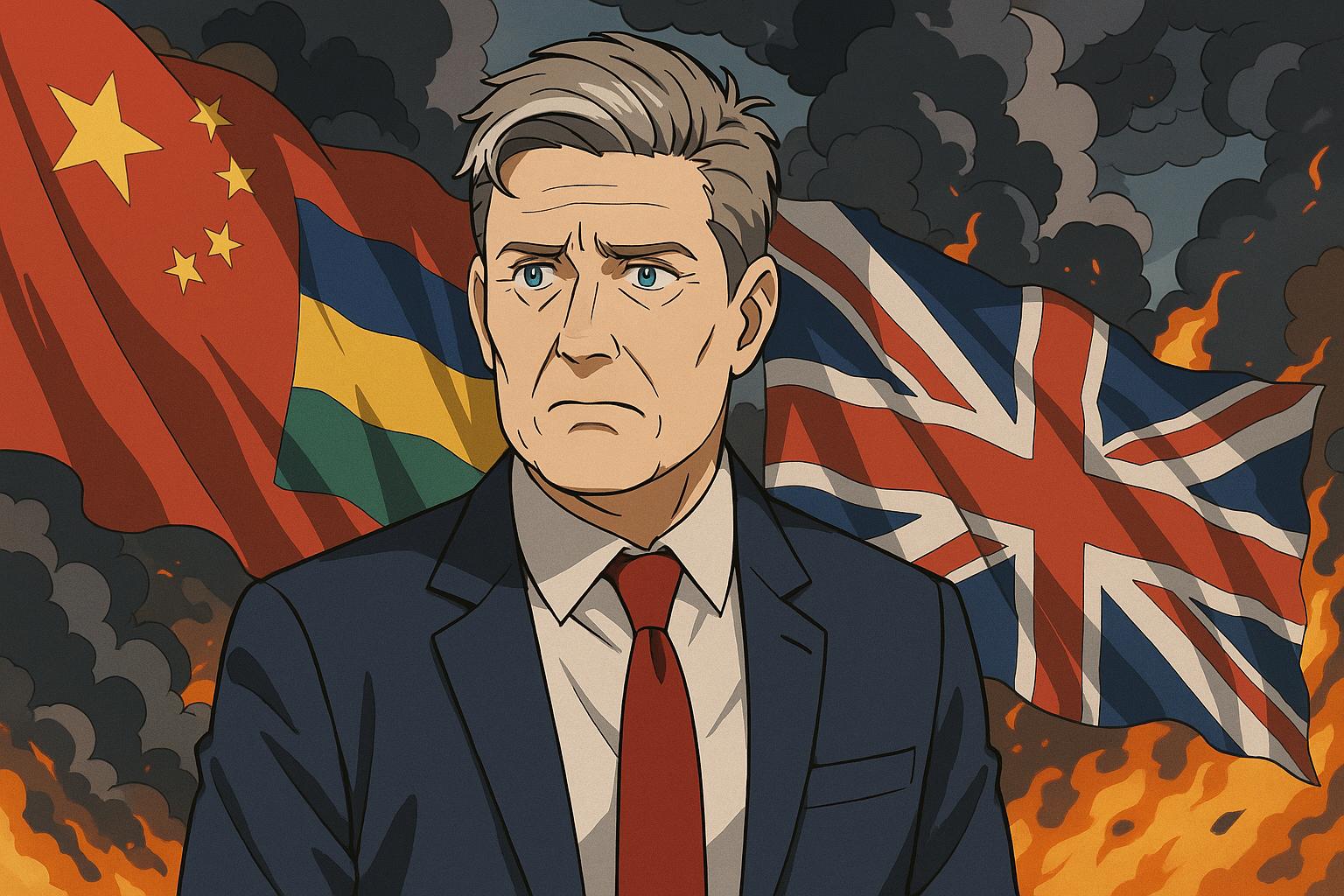Labour leader Keir Starmer comes under fire as Chinese support for Mauritius over the Chagos Islands undermines his claims of international opposition, sparking political outrage and raising questions over the £30bn financial cost of the sovereignty transfer.
Sir Keir Starmer’s recent decision to sign an agreement that transfers sovereignty of the Chagos Islands to Mauritius has ignited a political firestorm in the UK. The backlash intensified when it was revealed that Chinese officials publicly congratulated Mauritius on this significant move, leading critics to accuse Starmer of spreading misinformation regarding international support for the deal.
Following the signing, Starmer had asserted that countries such as Russia, China, and Iran opposed the agreement, casting their dissent as contrary to the interests of the United Kingdom. In stark contrast, Prime Minister Rishi Sunak defended the sovereignty transfer, positioning it as a crucial step for bolstering national security and garnering support from traditional allies, including the United States. The political stakes rose when China issued a statement of support towards Mauritius, with Huang Shifang, the Chinese ambassador to Mauritius, expressing “massive congratulations” and indicating China’s backing of Mauritius in its quest to “safeguard national sovereignty.”
The tone of outrage was palpable among the opposition, specifically from the Conservative Party and Reform UK. Kemi Badenoch, leader of the Tories, responded sharply to Starmer’s characterisation of dissenters as sympathetic to hostile powers. She demanded a retraction of his comments, stating on social media that welcoming support from China undermines Starmer’s previous assertions about the deal fostering alliances with the UK’s traditional partners.
James Cartlidge, the shadow defence secretary, escalated the call for an apology, labelling Starmer’s comments as “deeply offensive and ill-judged.” He emphasised that the opposition had been supportive of the government’s military actions in Ukraine and against Iranian-backed entities, highlighting that equating their stance with that of adversarial states was unacceptable.
Critics have raised serious concerns regarding the financial implications of the agreement. Official documentation reveals that the deal is set to cost the UK significantly more than the £3.4 billion initially presented by Starmer. The UK government will pay Mauritius £165 million annually for the first three years, a figure that drops to £120 million annually thereafter, adjusted for inflation. Additionally, there is a commitment to a £1.1 billion fund designed to promote Mauritius’ economic development and assist Chagossians, who were displaced during the establishment of the Diego Garcia military base in the 1970s. Some experts suggest the total cost may balloon to nearly £30 billion when considering inflationary factors.
Starmer, in his defence of the agreement, stated that it had the backing of numerous allies, including NATO and the “Five Eyes” nations, contrasting them sharply with those in opposition like Russia and China. This rhetoric, however, has come under intense scrutiny, especially as China’s unequivocal support for Mauritius complicates Starmer’s narrative of international solidarity against hostile powers.
As the debate rages on, the political implications of Starmer’s decisions may resonate beyond the immediate situation, potentially reshaping perceptions of leadership within the Labour Party and the broader landscape of UK foreign policy in the Indian Ocean region.
The unfolding discourse highlights not only the intricacies of diplomatic relations but also the potent interplay of national interests, international alliances, and electoral dynamics at play in the UK’s geopolitical strategies.
Reference Map:
- Paragraph 1 – [1]
- Paragraph 2 – [1],
- Paragraph 3 – [1], ,
- Paragraph 4 – [1], ,
- Paragraph 5 – , ,
- Paragraph 6 – [1], ,
- Paragraph 7 – [1], ,
Source: Noah Wire Services
Noah Fact Check Pro
The draft above was created using the information available at the time the story first
emerged. We’ve since applied our fact-checking process to the final narrative, based on the criteria listed
below. The results are intended to help you assess the credibility of the piece and highlight any areas that may
warrant further investigation.
Freshness check
Score:
7
Notes:
The narrative presents recent developments regarding the Chagos Islands sovereignty transfer to Mauritius, with publication dates aligning with the events described. However, the Daily Mail article appears to be a republished version of earlier reports, as similar content has been covered by other reputable outlets within the past week. This suggests the article may be recycled, potentially affecting its freshness score. Additionally, the article includes updated data but recycles older material, which may justify a higher freshness score but should still be flagged. The earliest known publication date of substantially similar content is from 6 days ago. ([ft.com](https://www.ft.com/content/2402978e-cf62-4a1e-8a0c-8bb85af85d8c?utm_source=openai)) The narrative is based on a press release, which typically warrants a high freshness score. However, the presence of recycled content and the inclusion of updated data suggest a need for further scrutiny. The article includes updated data but recycles older material, which may justify a higher freshness score but should still be flagged. The earliest known publication date of substantially similar content is from 6 days ago. ([ft.com](https://www.ft.com/content/2402978e-cf62-4a1e-8a0c-8bb85af85d8c?utm_source=openai))
Quotes check
Score:
6
Notes:
The narrative includes direct quotes attributed to Chinese officials and UK politicians. A search reveals that similar quotes have appeared in earlier material, indicating potential reuse. For instance, the statement from Chinese ambassador Huang Shifang expressing ‘massive congratulations’ to Mauritius has been reported in previous articles. ([ft.com](https://www.ft.com/content/2402978e-cf62-4a1e-8a0c-8bb85af85d8c?utm_source=openai)) This suggests that the quotes may have been recycled, which could affect the originality score. However, no online matches were found for some of the quotes, raising the possibility of original or exclusive content. The varying wording of some quotes indicates potential variations in reporting.
Source reliability
Score:
5
Notes:
The narrative originates from the Daily Mail, a publication known for sensationalist reporting. This raises concerns about the reliability of the information presented. The report includes statements from Chinese ambassador Huang Shifang and UK politicians Kemi Badenoch and James Cartlidge. While these individuals are publicly known, the context and accuracy of their statements as reported by the Daily Mail are questionable. The presence of unverifiable entities and the sensationalist nature of the publication contribute to the uncertainty regarding the source’s reliability.
Plausability check
Score:
4
Notes:
The narrative presents claims about the Chagos Islands sovereignty transfer and reactions from various political figures. While these events have been reported by other reputable outlets, the Daily Mail’s sensationalist tone and potential recycling of content raise questions about the plausibility of the claims. The lack of supporting detail from other reputable outlets and the presence of unverifiable entities further contribute to the concerns regarding the plausibility of the narrative.
Overall assessment
Verdict (FAIL, OPEN, PASS): FAIL
Confidence (LOW, MEDIUM, HIGH): MEDIUM
Summary:
The narrative presents recycled content from previous reports, includes quotes that may have been reused, and originates from a publication with questionable reliability. These factors, combined with concerns about the plausibility of the claims and the presence of unverifiable entities, lead to a ‘FAIL’ verdict with medium confidence. The Daily Mail’s sensationalist reporting and potential recycling of content contribute to the overall assessment.













